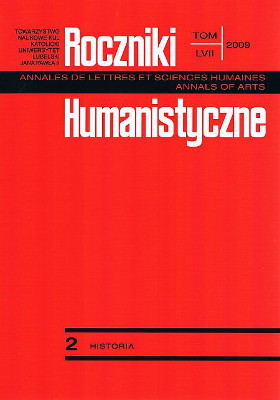From the Rule of Commons to Monarchisms? Henryk Schmitt's Late Views
Abstract
Up till now Henryk Schmitt has been presented in the literature of the subject as a historian with rather stable views. The aim of the present article is to show the character of the shift in the emphasis in Schmitt's historiography that happened at the second stage of his historiographic work, especially after 1868. Introduction of a different criterion for evaluating history was a sign of the change in the way he approached the past. Apart from the ideas he borrowed from Joachim Lelewel an additional criterion appeared: that of common good, which opened the possibility of different assessments of the past than before. It was at that time that Schmitt noticed the insufficiency of the republican conception and he broadened his point of view by introducing a superior criterion of common good. From this perspective he perceived as positive the aspirations of such magnates as Adam Krasiński or the Czartoryskis, and even King Stanisław August Poniatowski, whom he had sharply criticized before. This perspective allowed the supporter of republicanism to abandon criticizing the projects directed towards monarchy. In the late period of Schmitt's work also his views about methodology changed. He had opted for the factual model of historiography, but towards the end of his life considering historical events from the point of view of the very events, going beyond the description that signified searching for some idea or some individuality under the surface; making the nation the subjects of a historian's study, were an expression of a historian's participation in the discourse of the Romantic view of history.
References
Adamus J.: Monarchizm i republikanizm w syntezie dziejów Polski, Łódź 1961.
Górczyński W.: Henryk Schmitt (1817-1883), w: Złota księga historiografii lwowskiej XIX i XX wieku, red. J. Maternicki przy współpracy L. Zaszkilniaka, Rzeszów 2007, s. 81-100.
Górczyński W.: Podręcznikowe zarysy dziejów Polski Henryka Schmitta, w: Wielokulturowe środowisko historyczne Lwowa w XIX i XX w., t. II, red. J.Maternicki, L. Zaszkilniak, Rzeszów 2004, s. 70-81.
Górczyński W.: Prace monograficzne Henryka Schmitta, w: Wielokulturowe środowisko historyczne Lwowa w XIX i XX w., t. IV, red. L. Zaszkilniak, J. Maternicki, Lwów−Rzeszów 2006, s. 122-145.
Grabski A. F.: Perspektywy przeszłości, Lublin 1983.
Lelewel J.: Panowanie Stanisława Augusta, w: Dzieła, t. VII, Historia polski nowożytnej, oprac. J. Dutkiewicz, M.H.Serejski, H. Więckowska, Warszawa 1961.
Schmitt H.: Dzieje panowania Stanisława Augusta Poniatowskiego, t. I-III, Lwów 1868-1880.
Schmitt H.: Dzieje Polski XVIII i XIX wieku osnowane przeważnie na niewydajnych dotąd źródłach, t. II, Kraków 1866.
Schmitt H.: Dzieje Porozbiorowe Polski (1795-1832), wyd. II, Lwów 1894.
Schmitt H.: Kilka myśli na czasie w sprawach publicznych, Lwów 1877.
Schmitt H.: Narodowość polska, jej podstawy, rozwój dziejowy, przeobrażenia i zboczenia oraz stosunek do chwili obecnej, Lwów 1862.
Schmitt H.: Rozbiór krytyczny pomysłów historiograficznych i odkryć dziejowych Pana Antoniego Walewskiego członka czynnego krakowskiej akademii umiejętności, Lwów 1875.
Wierzbicki A.: Historiografia polska doby romantyzmu, Wrocław 1999.
Wierzbicki A.: Konstytucja 3 Maja w historiografii polskiej, Warszawa 1993.
Copyright (c) 2009 Roczniki Humanistyczne

This work is licensed under a Creative Commons Attribution-NonCommercial-NoDerivatives 4.0 International License.





